Conscript Arrested After Killing Five In Kerman Barracks
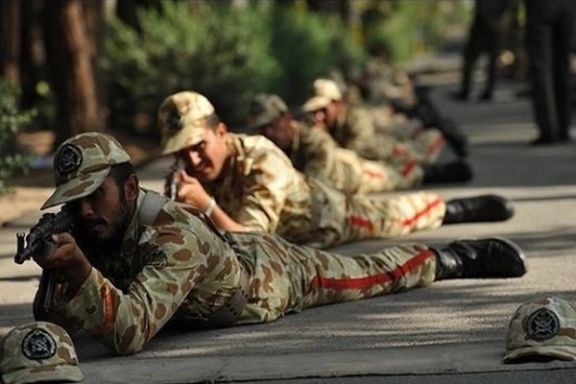
An army conscript who killed five colleagues in the squad room while on duty in Kerman barracks, has been apprehended near Zarinshahr county, officials say.

An army conscript who killed five colleagues in the squad room while on duty in Kerman barracks, has been apprehended near Zarinshahr county, officials say.
Naser Farshid, commander of law enforcement in Kerman province revealed that “the apprehended soldier was found in possession of two Kalashnikov rifles and six magazines containing a total of 180 rounds.” His motive is currently under investigation.
Citing the Islamic Republic Army, Tasnim News Agency has released the names of the five conscripted soldiers who lost their lives in the shooting.
The incident follows earlier reports in Iranian media about soldiers resorting to violence against their comrades or military authorities during their service. The motives behind such incidents are not officially disclosed by the military authorities of the Islamic Republic.
In a similar incident last year, a soldier in a barracks in the city of Deylam killed four other soldiers after taking them hostage. Iranian media attributed the soldier's motives for the killings and hostage-taking to not having been allowed to take leave.
Military service in Iran, known as "compulsory military service," is obligatory for all Iranian men above the age of 18, with certain exemptions. The mandatory 21 to 24-month service has faced criticism due to the physical and psychological pressures on soldiers, sometimes leading to outcomes such as suicide or violent acts.
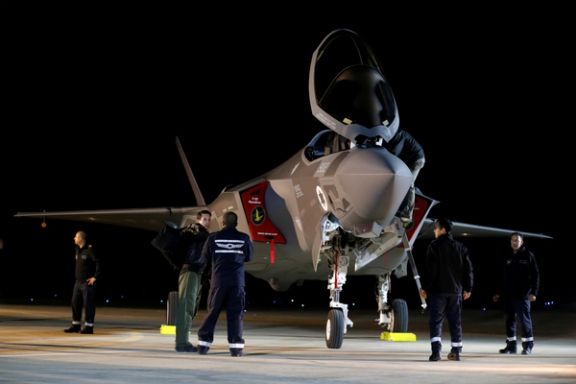
Israeli air force bases hosting advanced warplanes should be the target for Iran and its proxies to attack, a conservative newspaper in Iran said on Monday.
Khorassan newspaper carried an article by Hamed Rahimpur arguing that Israel seems eager to go after valuable targets affiliated with Iran and its allies and therefore, the Tehran needs to establish deterrence and pose a credible threat.
In recent weeks, Israel is suspected of targeted airstrikes that have killed several high-ranking Revolutionary Guard officers and top operatives of Iran’s ally, the Lebanese Hezbollah and Hamas.
The successful campaign has put the Iranian regime in an awkward position of either tolerating the Israeli attacks or retaliate and risk a wider war. Iranian officials have been saying that one aim of the Israeli campaign is to draw Iran into a war, and this should be avoided.
"When an enemy makes a final decision to eliminate someone, sooner or later, they will act on their decision,” the article said and continued that the key issue is to be able to change the enemy’s calculus in predicting Iran’s response.
Khorassan newspaper suggested that Iran or its proxies should focus on attacking Israeli airbases hosting the F-35 advanced fighters to present a credible deterrence to further attacks on their valuable assets. The newspaper mentioned bases in Eilat, where it said Iran’s proxies have tested the feasibility of strikes, presumable with missiles.
Iranian-backed militia last week retaliated against a US base in Iraq after five of its IRGC officers were killed in an airstrike in Damascus, Syria.
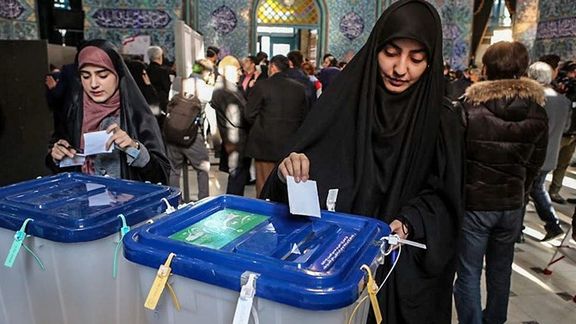
With all the talk about Iran's fate in a possible escalation of war in the region, the parliamentary election on March 1 is not the foremost concern for Iranians.
Besides immediate fears of war and conflict, Iranian media also highlight expectations of a low turnout amid a general indifference to the regime’s highly manipulated elections.
Nevertheless, Iranian media are passionately discussing what the election might hold for Iranians, although almost all of them are quite sure that ultraconservatives will win the majority of seats in the parliament (Majles).
Reports in the reformist media alternate between the news of fresh divides and new alliances in the conservative camp. Arman Melli, a reformist daily, wrote last week with a high degree of certainty that "Conservatives are unlikely to reach unity."
The daily argued that although it is too early to predict what will happen in the conservative camp, the dynamics among conservative groups indicate that there is a likelihood of an alliance, and it is almost certain that Majles Speaker Mohammad Bagher Ghalibaf's name will be at the top of the conservatives' list of candidates.
This comes despite Ghalibaf not being the most popular figure among Iranian conservatives, as even members of the parliament have lately criticized him harshly for his inaction and his failure to establish the parliament's supervisory role.
Yet, the daily speculated that there are more signs in the conservative camp indicating divides among various groups. Arman Melli wrote that the sheer number of various groups is more indicative of divides than alliances. The daily noted that all conservative groups in Iran believe that unity is something good only if they are the leader of the alliance. This is what can easily turn the illusion of an alliance into solid signs of divide.
Another pro-reform daily, Arman Emrooz, wrote on January 16 that an alliance is likely to be formed by conservative groups, led by the hardliner Paydari Party, which holds the majority in the current Majles and most of the cabinet ministers of the Raisi Administration are its members. The daily argued that accepting Paydari's leadership is the only condition that can bring about an alliance among Iranian conservatives.
Arman Emrooz added that key conservative figures such as father figure Gholam Ali Haddad Adel and Assadollah Badamchian of the Islamic Coalition Party have already agreed that Paydari should lead other conservative parties and political groups. Although the two men are influential enough, but other conservative groups have still not voiced their views about Paydari's leadership.
Badamchain has recently said that his party has 200 candidates for constituencies all over the country. It appears that there is currently an agreement among conservatives that Paydari should continue to hold the majority of the Majles under the speakership of current Speaker Mohammad Baghert Ghalibaf. This was the arrangement that was first made after the current Majles convened for the first time in May 2020. Ghalibaf does not have a big number of followers in or out of the parliament, but despite essential differences, even Paydari agrees that as a relative of Supreme Leader Ali Khamenei, Ghalibaf can be a good leader for the Majles, and his kinship ties gives him the leverage to resist pressures coming from the executive branch.
However, Ghalibaf has powerful rivals in the internal election for choosing a speaker. Paydari's Leader Sadeq Mahsouli, and the Chairman of its Central Council Morteza Aqa Tehrani have always been serious competitors for the post. In the next Majles, there is a true conservative heavyweight Ghalibaf and others need to tackle: Mohammad Reza Bahonar. Even hardliner Mohammad Hossein Naqavi Hosseini says Bahonar stands way higher than others in the competition for the post of the speaker of the parliament.
The only thing that can stop Bahonar, a seasoned politician and a former Vice Speaker, from rising to the position of Speaker is a sold alliance among other conservative groups, Naqavi Hosseini said.
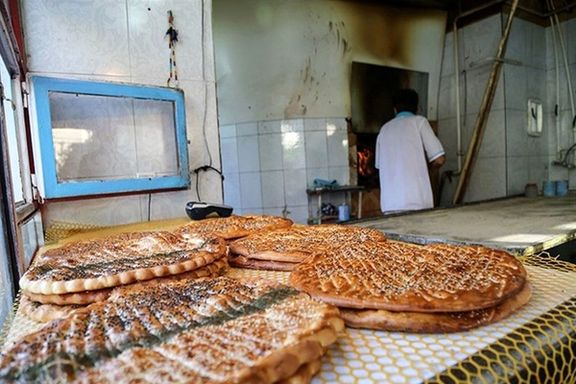
Iran has imposed nationwide bread rations with penalties for bakers breaking the new rules amid the country's worst economic crisis since the birth of the Islamic Republic.
Eqtesad100, a prominent Iranian news website, scrutinized the contradictory statements from government officials and bakers in a detailed report on Sunday. The situation became more complex with reports circulating about a directive from the Baker's Union.
While some sources suggested citizens are prohibited from purchasing more than "four loaves with one bank card," Eqtesad100, citing confirmed reports from the union, indicated that the sale of "more than three Barbari breads with one bank card" is prohibited.
The reported restrictions, if violated by bakers, trigger a penalty, as they receive a notification of "unauthorized sale" in a specialized system.
Amir Karamlou, head of the inspection commission of the Traditional Bakers' Union in Tehran, said on Saturday that Tehran bakers must adhere to specific requirements.
“To earn certification, (Barbari) bakers must sell each sack of flour to 32 people, with each transaction involving a different bank card.”
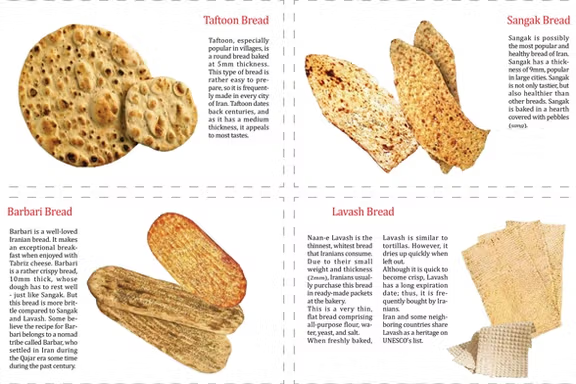
The reports also indicate that the sale of more than 10 Lavash bread to a single individual is prohibited.
Contradicting the measures, Mohammad Jalal, the economic adviser to the economy minister, asserted three days ago that "nothing has happened in the field of bread supply." He described the new measures as an effort to “organize the bread situation and prevent the smuggling of flour and bread. Bakers are now required to register the amount of bread sold and conduct transactions exclusively through bank cards.”
However, an informed source confirmed a reduction in the flour quota provided by the government and bread rationing in specific areas, hinting at a potential review of plans to review subsidies and increase prices.
This contradicts earlier declarations by Iranian officials who categorized price hikes and rationing of traditional bread as red lines.
Introduced in April 2018 amid economic uncertainties triggered by former US President Donald Trump's withdrawal from the Joint Comprehensive Plan of Action (JCPOA), Iran's national subsidy aimed to stabilize prices for essential goods.
As the national currency faced a significant decline, the government, led by President Hassan Rouhani, provided cheap dollars to importers, particularly for vital commodities like flour.
On May 1, 2022, the parliament, despite warnings of increased inflation, approved the government's decision to eliminate the annual $10-14 billion subsidy for essential food and medicine. The move, coupled with an existing inflation rate of around 40 percent, resulted in a ten-fold increase in the price of flour.
To mitigate the impact on citizens, President Ebrahim Raisi's administration introduced a "smart plan" for the continued subsidy of bread. The government issued digital cards tied to specific purchases, aiming to prevent the smuggling of subsidized flour and bread to neighboring countries where they could be sold at significantly higher prices.
However, bakers have raised concerns about the ration card system, citing disruptions in trade during internet outages and delays in government reimbursement for subsidized bread. The challenges faced by bakers have highlighted issues with the implementation of the new system.
The substantial surge in flour prices, following the removal of subsidies, has had a ripple effect on various other goods, including pasta, biscuits, and cakes. These price increases have affected consumers, particularly those in vulnerable economic conditions. Additionally, bakeries offering non-traditional loaf breads operate at unsubsidized prices, creating disparities in the cost of different bread varieties.
In spite of this and in the face of global sanctions, Iran continues to pour billions of dollars' worth of funding into its regional proxies and the domestic military budget, while the nation faces crippling economic turmoil.
Palestinian groups alone such as Gaza based Hamas, have been found to receive around $100m annually, according to US government evidence. Larger proxies such as Hezbollah in Lebanon and the Houthis in Yemen, receive much more.

Anahita Amirpour, a 20-year-old student, was shot dead by plainclothes intelligence ministry agents in the city of Borujerd, Lorestan province.
It is believed that Amirpour, a first-semester physical education student at Azad University lost her life when intelligence forces pursued the car she was in. The car's driver, M. Jalayi-far, also a student and Borujerd resident, sustained severe injuries and is currently hospitalized.
Hengaw Human Rights Organization, a Kurdish rights group, says the intelligence forces claim the incident was linked to a recent terror attack in Kerman. Two explosions during the fourth memorial of former IRGC commander Qasem Soleimani on January 3 killed around 90 people in Kerman. The strategy aims to reframe the intentional killing as part of a scripted security case.
It is not clear why the agents tried to stop the car, although some speculate that it could be hijab enforcement related.
Rights group sources indicate that as the plainclothes forces approached the students' car, instructing them to stop and exit the vehicle, the intimidated driver panicked and attempted to flee. Subsequently, the intelligence forces opened fire and seized the car.
Over the past two days, security entities have reportedly pressured the families and friends of the victims not to disclose information about the incident. Two personnel from Chamran Hospital were also summoned and threatened by intelligence authorities.
While security and law enforcement authorities in Borujerd have not issued public statements, Governor Moslem Moradi vaguely referenced the incident, attributing it to recent terrorist attacks and confrontations with criminal elements. Hengaw sources reject Moradi's claims, emphasizing that intelligence forces deliberately targeted the students, leading to Amirpour's death.
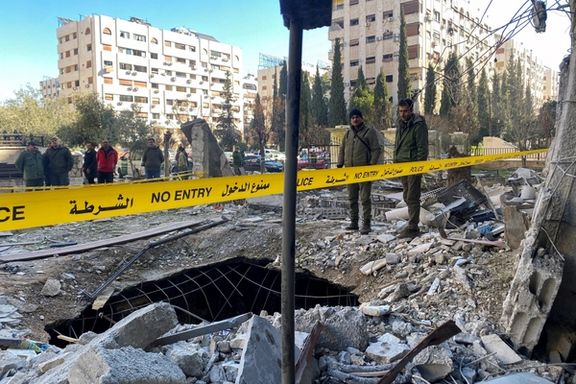
Israeli airstrikes in Syria that killed several IRGC generals have unleashed a barrage of "cutlet" photos online, a popular dish now symbolizing Iran’s slain Guards.
The association started with the targeted killing of former IRGC Quds Force commander Qasem Soleimani, whose body was so mutilated in a US drone strike in 2020 that people described him as a “cutlet,” a popular dish like burgers made of ground beef and potatoes.
Iranian regime opponents observe his death anniversary as "Cutlet Day" on various social media platforms, a symbolic protest act that has seen several people arrested. The recent surge in such surgical strikes has ushered in a "Cutlet Season” as dissident activists took to social media with different photos of cutlets.
On Saturday, the IRGC confirmed that four of its forces lost their lives in the airstrikes on a building in the Mazzeh neighborhood in Damascus. A fifth IRGC officer later succumbed to his wounds and died. Among the dead was Hojatollah Omidvar, also known as Haj Sadegh and Yousef Omidzadeh, who served as the head of the RGC’s extraterritorial Quds force intelligence unit in Syria. According to Iranian state media, Omidvar’s deputy was also killed in the attack.
On December 25, another suspected Israeli airstrike targeted and killed another top Iranian IRGC general, Razi Mousavi, at his residence near Damascus. Additionally, several high-ranking military commanders of Iran-backed militia -- such as Hamas in Gaza, Hezbollah in Lebanon and Harakat Hezbollah al-Nujaba in Iraq – were killed. On Sunday, three more IRGC members were killed in a US-led strike on Houthi rebels of Yemen.
In addition to celebrating “Cutlet Season” and quipping about a more extensive menu by Israeli Prime Minister Benjamin Netanyahu, a photo that is widely circulated is Iran’s Supreme Leader Ali Khamenei surrounded with cutlet patties instead of a group of his inner circle. Another widely shared post is a symbolic weekly schedule of the Supreme Leader, with most of his week spent on funeral prayers for the slain IRGC generals.
The hardline daily Farhikhtegan has published a list of senior IRGC “military advisors” killed since 2015 in Syria, claiming that eight out of the total of 20 have been killed since Iran-backed Hamas started the war against Israel on October 7. The list probably ignored mid-ranking people as it pertains to only seven strikes while Israel has reportedly had around 600 airstrikes since April 2017.
The increasing fatalities among IRGC men have also led to speculations that Israel may have been tipped off about the whereabouts of the targets by Russia. Centrist Aftab News website in Tehran ran an article Sunday -- titled “The coordination between Israel and Russia in Syria is not very hidden” -- citing several Iranian officials and activists who mentioned the alleged coordination.
Lawmaker Mohammad Esmail Kowsari, who is a former IRGC commander, said, “Spies in Damascus must be arrested." Addressing President Ebrahim Raisi, journalist Alireza Mostafa said, “Please ask President Vladimir Putin why the Russian S-400 air defense system is never activated in Syria to protect Iran's interests? Isn’t Russia a strategic ally of Iran?”
According to conservative commentator Sadegh Hosseini, “Since the increased and consolidated presence of Russians in Syria, we have witnessed a rise in Israel’s aerial attacks against Iranian forces. The recent assassinations in Syria underscore the need for a reassessment of Iran-Russia relations in Syria.”
The Islamic Republic's intelligence failures extend beyond overseas operations, evident in the recent twin blasts during Soleimani's death anniversary ceremonies in Kerman. Pointing the finger at Russia while Iranians are mocking IRGC casualties is further proof that Iranians do not take seriously the regime figures who keep threatening Israel with a firm response, but nothing happens.